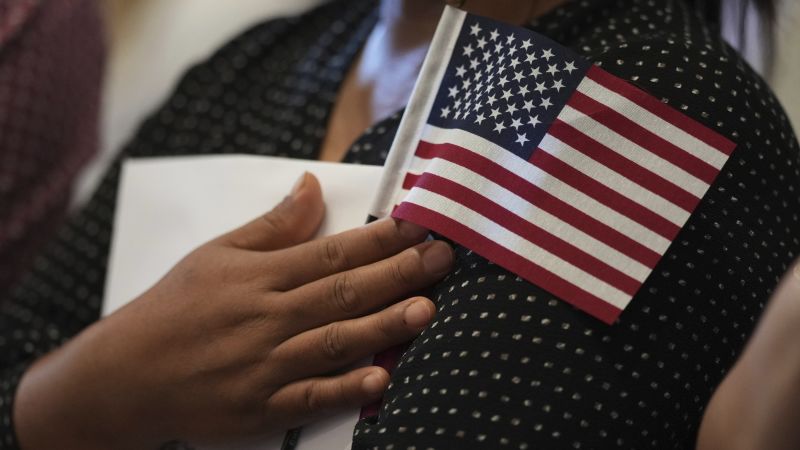Immigration
Immigration politics
National security
Terrorism
Tweet
Email
Link
People applying to live or work in the United States will now be screened for “anti-Americanism,” including having their social media checked, authorities announced on Tuesday, in a tightening of restrictions that has alarmed immigration advocates and lawyers.
Immigration officers will be able to look at whether applicants have had “any involvement in anti-American or terrorist organizations,” or whether there is any “evidence of antisemitic activity,” said the policy update by US Citizenship & Immigration Services (USCIS).
Social media vetting, already introduced into immigration screening in June by the Trump administration, will be expanded to include searches for any “anti-American activity,” it said.
It’s the latest step in the administration’s crackdown on immigration regulations, with many new actions likely to deter immigrants and international students from coming to the US.
The State Department has revoked more than 6,000 student visas this year, an official said on Monday. And in June, the State Department said embassies and consulates must vet student visa applicants for “hostile attitudes towards our citizens, culture, government, institutions, or founding principles.”
“America’s benefits should not be given to those who despise the country and promote anti-American ideologies,” said USCIS spokesperson Matthew Tragesser in a news release on Tuesday.
He added that the immigration agency was “committed to implementing policies and procedures that root out anti-Americanism and supporting the enforcement of rigorous screening and vetting measures to the fullest extent possible.”
The policy update did not give a specific definition for “anti-Americanism,” only saying this included those who supported “antisemitic terrorism, antisemitic terrorist organizations, and antisemitic ideologies.”
But it pointed to a section of the 1952 Immigration and Nationality Act (INA) for examples of “anti-American” ideologies. The section in the Act, the US’ overarching legal framework for immigration, bans certain people from becoming naturalized citizens – including members of various Communist parties, those who advocate for “world communism,” those who write or distribute materials opposing “all organized government,” or those who wish to overthrow the US government by force or violence.
The announcement immediately stoked confusion and alarm, with online forums debating what counted as “anti-American.” Many worried that the vague wording and lack of clear definition would give immigration officers the power to crack down further on immigration, regardless of a genuine threat.
“Is being against the recent strike in Iran or being in favor of a cease fire in Gaza anti-American or antisemitic?” read one Reddit post in an immigration discussion. “What if you personally don’t like Trump as a President or you shared a post on the recent South Park episodes making fun of him (and Homeland Security Secretary Kristi) Noem?”
Immigration experts and lawyers are worried, too.
“The term (anti-Americanism) has no prior precedent in immigration law and its definition is entirely up to the Trump (administration),” said Aaron Reichlin-Melnick, a senior fellow at the American Immigration Council, in a post on X.
He added that the move was reminiscent of McCarthyism – the period of the 1950s also known as the Red Scare, when authorities prosecuted left-wing individuals amid a widespread public panic over communism and its influence on American institutions.
Steven Brown, an immigration attorney based in Houston, also posted on X that so-called American values were “a subjective standard not found in the INA.”
“For me, the really big story is they are opening the door for stereotypes and prejudice and implicit bias to take the wheel in these decisions. That’s really worrisome,” said Jane Lilly Lopez, associate professor of sociology at Brigham Young University, according to the Associated Press.
“It means you are going to just do a whole lot more work to provide evidence that you meet our standards,” Lopez said.
